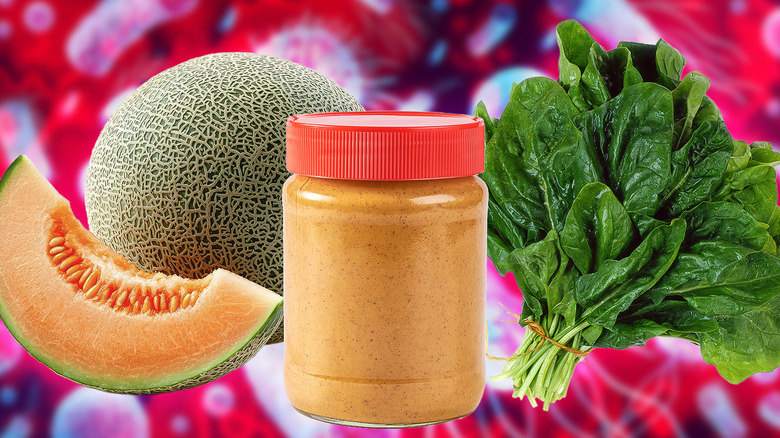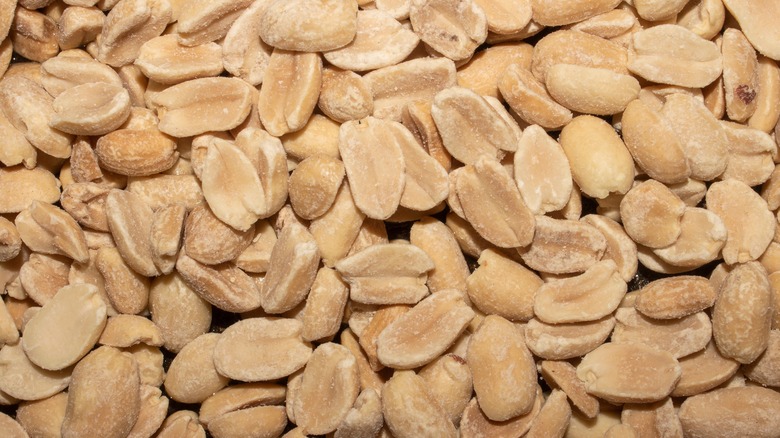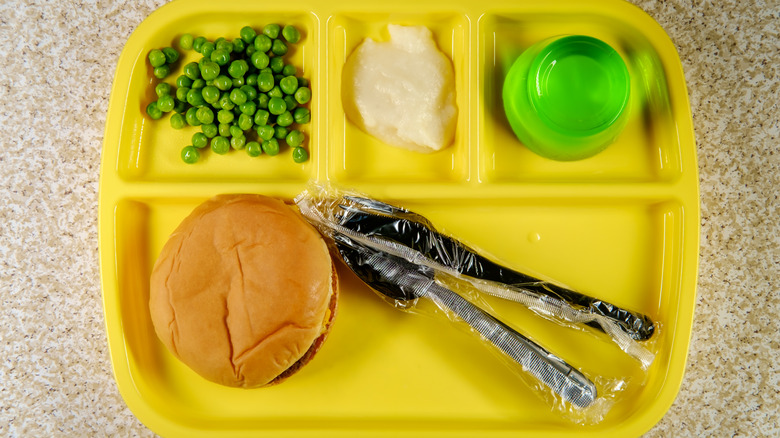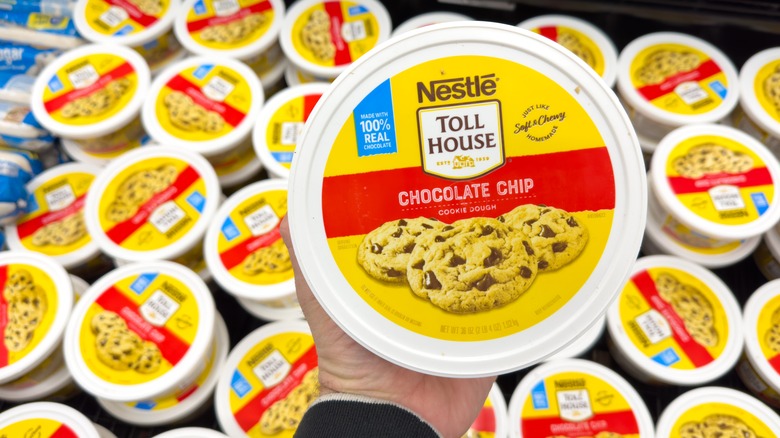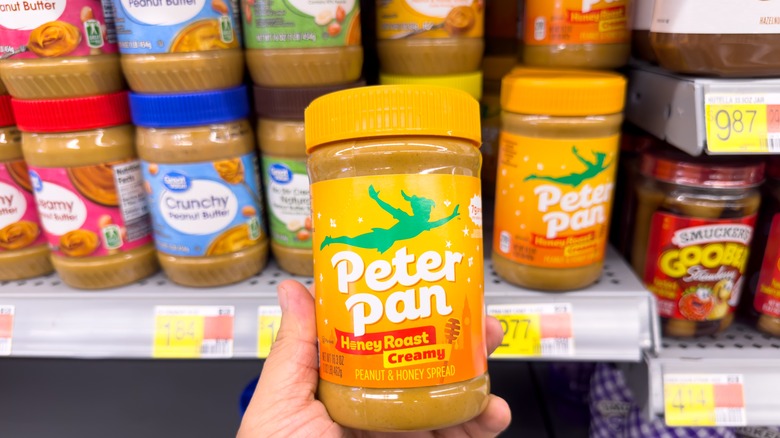10 Of The Worst Food Recalls In US History
There's been another food recall. You check the kitchen to see if the culprit is currently taking up residence in the pantry or refrigerator. If you're lucky, you catch the news in time to dispose of the product. If you're luckier, you've never purchased the product. But not everyone is so lucky. The Center for Disease Control and Prevention (CDC) estimates that foodborne illnesses sicken about 48 million people and cause 3,000 deaths and 128,000 hospitalizations per year.
Foodborne illnesses have plagued humans for centuries, yet documentation and regulation have evolved slowly as we've navigated the do's and don'ts of food preparation, storage, distribution, and consumption. While the 1785 Massachusetts "Act Against Selling Unwholesome Provisions" is believed to be the first law involving food safety in the United States, documentation of foodborne illnesses did not begin until the late 1800s, with regulations being established and continuously refined after the formation of the U.S. Department of Agriculture (USDA) in 1862 and the Pure Food and Drug Act (which later became the Federal Drug Administration) in 1906.
In 1920, the first major food recall in the U.S. involved canned olives from California contaminated with botulism. Since then, warnings and recalls of varying classes are a regular occurrence, with products being pulled from the shelves for potential contamination, incorrect processing, or mislabeling. Whether the deadliest, largest, most costly, or most scandalous, we've compiled our list of the 10 worst food recalls in the United States.
Listeria in cantaloupe caused 33 deaths
With its neutral exterior and juicy interior, the often-ignored second fiddle of the fruit salad seems as benign as it is boring. Yet in 2011, cantaloupe made headlines nationwide as the worst listeria outbreaks in U.S. history.
The timeline began in early September of 2011, when the Colorado Department of Health alerted the CDC of seven people sickened with listeriosis in the state. Subsequent reports found that all of the ill people had eaten cantaloupe and an investigation led to cantaloupe producer Jensen Farms in southeast Colorado, who issued a voluntary recall of their whole cantaloupes. Fruit processing companies in Kansas City, Missouri, and Buffalo, New York, also initiated recalls of their cut mixed fruit products containing cantaloupe from Jensen Farms. Thirty-three people died, and 147 people across 28 states were sickened as a result of the contaminated fruit.
Investigations of the Jensen Farms facility found that the melons were likely contaminated by dirty water and old equipment. Farm owners, brothers Ryan and Eric Jensen were charged with criminal negligence and sentenced to five years probation and six months of home detention. They were also each ordered to pay $150,000 and perform 100 hours of community service. As a result of contributing to one of the deadliest food illness outbreaks in the U.S., Jensen Farms declared bankruptcy and later shuttered, but not before spurring a slew of new regulations and safety audit requirements.
The Peanut Corporation of America salmonella cover up
"Just ship it." These three words were the basis of the prosecution's case against Stewart Parnell, the executive at the helm of The Peanut Corporation of America (PCA), during the federal trial for a salmonella outbreak in peanut products that killed nine people and sickened 714 across 46 states between 2008 and 2009.
The first clusters of salmonella poisoning reports caught the attention of the CDC in early November 2008, and by late December, federal and state detectives had traced the source to King Nut creamy peanut butter and peanut paste, which was produced by and distributed in bulk from PCA's facility in Blakely, Georgia. By the end of January 2009, PCA had halted production and issued a voluntary recall of all peanut-related products it had produced since January 1, 2007. In all, more than 2,100 products across 17 categories, including pet food, were recalled by more than 200 companies.
The proverbial plot thickened, however, when investigations revealed that Parnell, his brother and food broker Michael, and plant manager Mary Wilkerson engaged in fraud and obstruction of justice when they sold products that had not been tested, retested, and sold batches that originally tested positive, and, in the case of the infamous "Just ship it" email reply, decided to ship batches that would otherwise be delayed because the results of salmonella tests were not available.
In what was not only one of the worst salmonella outbreaks in U.S. history but also the largest criminal sentence in a food safety case, Stewart Parnell was sentenced to 28 years in prison. His brother received a 20-year sentence and Wilkerson a five-year sentence. The company, which had been founded by the brothers' father in 1977, was closed for good.
E. Coli in spinach hospitalized hundreds
While there have been other cases of E. coli contamination in fresh spinach and lettuce over the last few decades, one case in 2006 ranks as the largest and most unique. In the fall of 2006, a multi-state outbreak of E. coli contamination was traced to bagged spinach produced in the Salinas Valley in California, the self-proclaimed "Salad Bowl of the World." On September 15, 2006, the FDA issued an expansive warning: don't eat spinach, bagged, or bulk. This was the first time the FDA had made such a grand statement impacting U.S.-grown produce. Spinach was pulled from restaurant menus and store shelves, and harvesting was halted for five days.
Although the FDA narrowed the source of the outbreak to a ranch in Salinas Valley neighbor, San Benito County, California, it was ultimately unable to determine the exact cause of the contamination. Ultimately, 205 people were reported sickened across 26 states, with more than 100 hospitalizations and three deaths. After the warnings were lifted, bagged spinach saw a $201.9M decline in consumer spending, while bulk spinach sales endured a $3.8M loss.
Deadly Listeria outbreak in Sara Lee Meat products
The Sara Lee Corporation makes our list for its role in one of the largest meat recalls in U.S. history. In late December of 1998, the manufacturer issued a $76M nationwide recall of 35 million pounds of hot dogs and lunch meat products spanning its numerous sub-brands, including Ball Park, Mr. Turkey, Bil Mar, Hygrade, and others for suspected listeria contamination.
Four months earlier, the CDC received the first reports of listeriosis illnesses caused by a rare strain of the bacterium. (20) In December, the strain was traced to a package of hot dogs, thus prompting the recall. Between August 1998 and January 1999, at least 80 illnesses, 15 deaths, and six miscarriages across 11 states were linked to the outbreak.
Eventually, Sara Lee's Bil Mar brand plant in Zeeland, Michigan, was designated the culprit of the major listeria outbreak, with inspectors citing roaches and unsanitary conditions contributing to the contamination. The Sara Lee Corp. pled guilty to misdemeanor charges and agreed to pay $4.4M for fines, food safety research, and a lawsuit settlement.
Animal cruelty unravels Hallmark/Westland
This next recall makes our list for being one of the largest and most devastating recalls without a single documented illness associated with it. It is the case of meatpacking company Hallmark/Westland, whose careless and inhumane treatment of its beef cattle was brought to light and prompted a recall of more than 143 million pounds of beef.
It all began with an undercover video made by the Humane Society in 2007, which showed workers at the Hallmark/Westland plant in Chino, California, mistreating sick and injured cows and forcing them to stand up. These so-called "downer" cows were banned by the Department of Agriculture from entering the food supply chain in an effort to mitigate Mad Cow Disease, however it was suspected that the "downer" cows at Hallmark/Westland may have not been properly inspected and could have been processed alongside healthy animals.
More than 143 million pounds of beef and frozen beef products are recalled, instigating a record-setting judgment for a case of animal abuse. A final judgment of $497 million against the former supplier to the National School Lunch Program was never paid in full, as the company became insolvent and closed its doors for good.
Nestle Toll House cookie dough recall
Who doesn't love a little nibble of cookie dough while baking a batch of cookies? Yes, we all know or should know, the risks of ingesting raw dough, but let's face it. When crafting cookie creations in our kitchen we tend to live life on the edge. Pre-packaged, ready-to-bake cookie dough takes us straight to that edge at warp speed. Open package, instant cookie dough in hand. But here's the kicker: unless you make your cookie dough safe to eat, raw cookie dough can make you sick. It did exactly that on a grand scale in 2009, when a contaminated batch of Nestle Toll House pre-packaged cookie dough sickened over 70 people, 35 of which were hospitalized, across 30 states. Ten of the victims developed a serious kidney disease called hemolytic uremic syndrome.
In March 2009, the CDC began investigating an E. coli illness outbreak. By June, they had determined the source to be Nestle Toll House pre-packaged cookie dough. Nestle immediately issued its largest recall to date: 3.6 million packages of its refrigerated cookie dough products.
It must have been the eggs, you say? Au contraire, mon frere. The prime suspect in this case of E. coli contamination was actually the flour. The eggs, sugar, baking soda, molasses, and margarine were pasteurized and thus subjected to a step that would kill any pathogens. The chocolate chips used in Nestle's morsels for home baking did not sicken anyone. So, that left the flour, which had not undergone any pasteurization process.
Despite warnings on the packaging advising consumers not to ingest raw dough, epidemiological reports showed that most of the people who were sickened admitted to ignoring this advice. After the recall, Nestle began utilizing pasteurized flour in its products and made their label warnings larger and more clear, "Do not consume without baking." They also issued a strong statement. According to the cookie people themselves: "No one should eat raw cookie dough, whether pre-packaged or made 'from scratch." Bah humbug.
Salmonella in peanut butter sickens hundreds
Two years prior to the Peanut Corporation of America coverup, food giant ConAgra had its own peanut saga. In 2006-2007, a salmonella outbreak linked to the Peter Pan and WalMart's Great Value brand of peanut butter sickened over 700 people across 47 states. The outbreak was traced to ConAgra's subsidiary plant in Sylvester, Georgia. The plant was closed, and all peanut butter produced there since 2004 was recalled. The Peter Pan brand peanut butter remained off the shelves for half a year.
However, nearly a decade later (and one year after Stewart Parnell of PCA was sentenced to 28 years in jail), the subsidiary of ConAgra responsible for the Sylvester, Georgia plant pled guilty to the misdemeanor charge of introducing adulterated food into interstate commerce and was levied an $8 criminal million fine plus a $3.2 million asset forfeiture. Intended to send a strong message to food processors and the standards they are expected to uphold, this fine was the largest ever levied in such a case.
Topps Meat Company ground beef recall
2007 was a busy year for recalls and this one makes our list for its severe and immediate impact on the largest manufacturer of frozen hamburgers in the U.S. In the summer of 2007, the CDC's investigation into an outbreak of E. coli-related illnesses in Connecticut, Florida, Pennsylvania, Ohio, New York, Indiana, New Jersey, and Maine was traced to frozen hamburger patties produced by the Topps Meat Company of Elizabeth, New Jersey. The convenient burger patties sickened thirty people across those states.
The company began recalling its beef patty products in late September, but the recall was expanded to include 21.7 million pounds of ground beef, which amounted to a full year's production. At the same time, families of sickened consumers filed a class-action lawsuit and the USDA announced a "notice of intended enforcement." While this was the first recall in the company's 67-year history, the costs of the recall and potential lawsuit were too much for the privately held corporation, which had less than 100 employees. Six days after the recall was initiated Topps Meat Company closed its doors for good. The exact source of the E. coli contamination was never identified.
Deadly Jack in the Box outbreak
One of the scariest and deadliest food recalls in U.S. history involved a food product with an equally scary name. The "Monster Burger" was a popular menu item at the fast food chain Jack in the Box, but when corporate decided to offer the burger at a discount in late 1992 and early 1993, the surge in demand led to undercooked burgers made from meat which happened to be contaminated with E. coli. The massive outbreak infected over 700 people, more than 100 of whom were hospitalized, and four children died.
Jack in the Box halted the production of the Monster Burgers and quarantined the suspected meat, but the case spurred numerous questions and regulations in food safety, including raising the federal guidelines on the internal temperature of cooked meat from 140 to 155. Interestingly, prior to 1994 a certain amount of the same E. coli variant found in the Monster Burger was acceptable as it was presumed the bacteria would be killed during the cooking process. This pivotal case prompted the establishment of more strict food safety regulations, and it is now illegal to sell hamburger meat containing this E. coli variant.
Boar's Head recall ends its liverwurst line
Rounding up our list of the ten worst food recalls in U.S. history is the case of a listeria outbreak in Boar's Head deli meat. In the summer of 2024, investigations into an outbreak of listeriosis infections in the Baltimore, Maryland area yielded a match to the outbreak strain in a liverwurst product obtained by the Maryland Department of Health.
On July 26, Boar's Head Provisions Co. issued a recall of its ready-to-eat liverwurst products and other meats produced on the same day and line as the liverwurst at its Jarratt, Virginia facility, amounting to nearly 208,000 pounds of meat. Four days later, the recall was expanded to include everything produced at the facility, amounting to seven million more pounds of ready-to-eat poultry and deli products. The Jarratt, Virginia facility was closed, and citing the cause of the contamination to be related to the process used to specifically produce liverwurst, the company made the decision to permanently discontinue its production. Ten people died, and 61 people across 19 states were sickened, most of them hospitalized.
